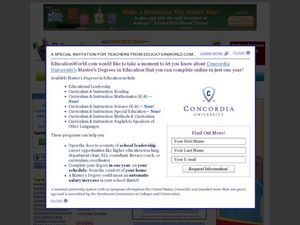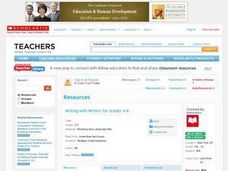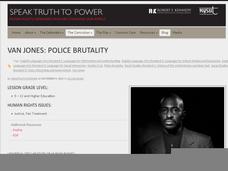Curated OER
Who's The Boss?
Upper elementary and middle schoolers research and analyze some different types of governments. Democracies, Monarchies, and Dictatorships are some of the types that are looked at. Learners use the Internet to gather information that...
Curated OER
The War of the Words
“Who’s This Guy Dylan Who’s Borrowing Lines From Henry Timrod?” The basic question in this lesson from the New York Time’s Learning Network is whether artists and authors who use the words of others are stealing from that artist or...
Curated OER
Corporate Governance
Examine the role of the Securities Exchange Commission. Upper graders watch a short Bill Moyers video, analyze a political cartoon, complete a graphic organizer on the SEC, and develop SEC reform strategies to rebuild investor confidence.
Curated OER
Debating the Issues: Ralph Bunche and Civil Rights
Synthesizing information from a PBS documentary Ralph Bunche: An American Odyssey, its companion website, and several other resources (links to which are provided), high schoolers evaluate whether Bunche did all he could to advance the...
Curated OER
Hey, Teacher, Leave My Kids Alone
What are the differences between homeschooling, traditional schooling, and unschooling? Middle and high schoolers examine the opinions of their peers on these varied types of education. After reading a New York Times article, they...
Curated OER
Cold War Era Film Censorship: High Noon- a Slice of Americana Or Communist
Students study of the effects of the Cold War on the home front. They analyze the film High Noon according to an abbreviated version of the standards that films were judged by in the early 1950s and determine whether or not High Noon is...
Curated OER
African Americans in World War II: Staging a Double V Campaign in the Classroom
The feelings and attitudes of African-Americans during World War II are examined by high schoolers. After watching various clips from "The War," they answer comprehension questions for each section. In groups, they create their own...
Curated OER
Good Sportsmanship Leads to Home Run
Pupils share examples of good sportsmanship, then read a news article about a team helping an injured player score a home run. The teacher introduces the article with a discussion and vocabulary activity, then students read the news...
Curated OER
SWOT Teams: Analyzing the Political Parties for the 2010 Midterm Elections
What are political parties and what so strategists do? In this political analysis lesson, learners analyze political strategies to understand their strengths and weaknesses. They use key details from the text to learn how to create...
Curated OER
US Constitution
Think about the Bill of Rights and the Declaration of Independence with your budding historians. They analyze the importance of historical documents by examining several famous documents, and then they complete activities that check...
Curated OER
Write with Writers
Write and work with authors on the Scholastic Website to promote the recognition of various genres. Young writers will participate in activities based on the type of writing such as biography, descriptive, folktales, mystery, news,...
Curated OER
What is Art?
Students become familiar with the art and architecture and history of the Chicago World's Fair. In this public arts project lesson, students compare and contrast fine art and public art through a study of the exhibits at the...
Curated OER
Examining the Form and Function of Campaign Speeches
An examination of stump speeches, one of the most important components of a presidential campaign, is made possible by accessing The New York Times Learning Network. After closely examining the form and function of stump speeches,...
Robert F. Kennedy Center for Justice and Human Rights
Vaclav Havel: Free Expression
Develop an understanding of universal human rights, particularly the freedom of expression, with the questions and activities that analyze the conflicts of Vaclav Havel. Learners define, interpret and rephrase the human rights article in...
Robert F. Kennedy Center for Justice and Human Rights
Van Jones: Police Brutality
Develop an understanding of how the media and society are connected and responsible for the defense of universal human rights. Learners investigate and examine the conflicts of police brutality as it is portrayed in the media and through...
American Documentary
The Benefits and Drawbacks of Plea Bargains
The outcome of 90 percent of criminal cases in the US is determined by plea bargains. Clips from the documentary Better This World create the backdrop for an investigation of the benefits and drawbacks of the plea bargaining process....
Delegation of the European Union to the United States
Cultural Identity
How does cultural diversity impact political identity? That is the question researchers face as they continue their examination of the European Union and the programs it has developed in its attempt to achieve unity in diversity. To gain...
PBS
President Theodore Roosevelt: Foreign Policy Statesman or Bully?
Can a negative perception of a president's foreign policy harm his or her historical legacy? A project that winds the clock back to the date of Theodore Roosevelt's death puts students at the editorial desk of a fictional newspaper....
PBS
Universal Declaration of Human Rights
What rights are guaranteed to students? Do they align with the Universal Declaration of Human Rights, which was approved by the United Nations in 1948? Middle and high schoolers present persuasive arguments about the rights they believe...
National History Day
“Saving the Bear”: The Russian Expeditionary Force of World War One
How have Russian politics affected countries on a global stage? The discussion of the Russian Revolution and World War I begins with an analysis of primary resource letters. Learners finish with a project where they create a timeline of...
Curated OER
The Preamble to the Constitution: How Do You Make a More Perfect Union?
Students analyze the Preamble of the Constitution and identify the historical context that led to its wording. They, in groups, interpret phrases from the Preamble, examine relevant court cases and create illustrations for their portion...
NPR
Civil Rights of Japanese-American Internees
Prompted by a viewing of Emiko and Chizu Omori’s Rabbit in the Moon, a documentary about the internment of Japanese-Americans during World War II, high schoolers examine a series of documents, including the Bill of Rights and the UN’s...
PBS
Historical Perspectives: Coming Home from War
What do the homecoming experiences of soldiers who fought in WWII, Vietnam, Iraq, and Afghanistan reveal about the politics and culture of the US during the time period of each war? Young historians view The Way We Get By, which tells...
Judicial Branch of California
Separate But Equal - Is It Black or White?
The story of Ruby Bridges and the case of Brown vs. The Board of Education are fantastic tools for discussing the concept of separate but equal. Kids tackle some big questions about what is fair, what is civil, and what rights or laws...
Other popular searches
- Civics and Economics
- Introduction to Civics
- Social Studies Civics
- Civics Political Cartoons
- Civics Project
- Civics Lesson Plans
- American Civics
- Civics Business
- Civics Civil War
- Civics Citizen
- U.s. American Civics
- Civics 2008 Election























